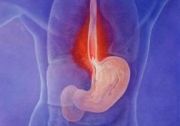Proton Pump Inhibitors Increase the Risk of Developing Community-acquired Pneumonia
Acid reduction from PPI treatment may alter bacterial flora in the digestive system, which may increase an individual's susceptibility to infection.

Taking proton pump inhibitors (PPIs) may increase the risk of developing community-acquired pneumonia (CAP), according to a recent meta-analysis presented on October 4, 2013 at IDWeek 2013, a joint meeting of the Infectious Diseases Society of America (IDSA), the Society for Healthcare Epidemiology of America (SHEA), the HIV Medicine Association (HIVMA), and the Pediatric Infectious Diseases Society (PIDS), in San Francisco, CA.
PPIs reduce the production of excess stomach acid, which may help treat stomach ulcers and gastroesophageal reflux disease (GERD). However, lead author Trevor Crowell, MD, from Johns Hopkins University School of Medicine states that PPIs are often prescribed “without an appropriate indication,” and have been associated with an increased risk of enteric infections, such as Clostridium difficile, and possibly CAP.
Crowell and colleagues performed a systematic search and analyzed data from 18 case-control studies, seven cohort studies, and four randomized controlled trials that investigated outpatient PPI treatment and CAP diagnosis in patients 18 years or older. A pooled analysis of these data revealed PPI therapy was associated with increased CAP risk. Although the mechanisms responsible for this increased risk are not completely clear, Crowell suggests that the reduction of acid from the PPI may change the bacterial flora in the digestive system, which may increase an individual’s susceptibility of infection.
The researchers further subdivided the studies to investigate the effects of patient age, PPI dosage, and treatment duration on CAP risk. Patient age and PPI dosage did not affect CAP risk in the studies that investigated these factors. However, CAP risk was highest within the first month of starting PPI treatment. According to Crowell, the acute change in the stomach acid and the bacterial environment of the digestive system may trigger CAP development. Crowell says that future research on how PPIs affect the digestive microbiota (the bacterial makeup) should be performed to better understand the link between PPIs and CAP development.
H2 receptor antagonists (H2RAs) are sometimes used in conjunction with PPIs to improve acid control in the digestive system. Crowell and colleagues analyzed eight studies that investigated whether H2RA exposure along with PPI therapy influenced CAP risk, and did not find any association between H2RA exposure and CAP risk.
According to Crowell, the significant association between PPI treatment and CAP risk should be recognized by healthcare providers, especially because providers often prescribe the PPI drugs unnecessarily and/or patients continue to take them long after they need them. He states that physicians should recognize the potential consequences of taking the drugs chronically and assess whether the benefits of PPI treatment outweigh the risks for their particular patient.
All authors listed financial disclosures.